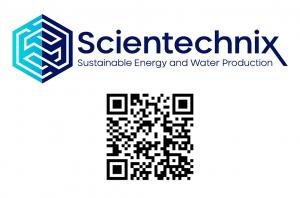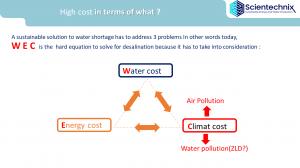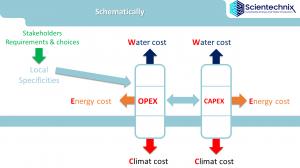Integrating the Climate Cost in Desalination and Water Projects
The WEC Equation as a New Evaluation Criterion for Desalination Projects
PARIS, FRANCE, April 18, 2023/EINPresswire.com/ -- In a presentation at the Arab Water Convention on February 20th 2023 in Dubai, Professor Dr. Alain Elayi, Director of Scientechnix, defined the WEC (Water-Energy-Climate) equation as the relevant criterion for evaluating the quality of a desalination project, rather than the simple cost per cubic meter of desalinated water adopted so far. This shift is necessary because, according to a 2020 International Energy Agency (IEA) report, desalination plants worldwide emitted approximately 120 million tons of CO2 in 2019. Ignoring this issue is no longer an option.Cost reduction remains the ultimate goal; however, it should also take into consideration water production, energy production, and climate preservation.
See attached image : Water Enery Climate nexus
Optimizing the cost of desalination through the WEC (Water-Energy-Climate nexus) equation takes into account nine parameters: three parameters for CAPEX (impact on the CAPEX of the Cost of Water, Energy, and Climate), three similar parameters for OPEX, the balance between OPEX and CAPEX, the available local specificities (such as the circular economy), and finally the essential stakeholders' requirements parameter.
See attached image : Water Energy Climate parameters
The figures, provided by Scientechnix, are available at: https://www.youtube.com/@mudt-Scientechnix, Prof. Dr. Alain Elayi's proposal for evaluating the climate cost is as follows: as a starting point, the projects range from including zero effort for climate preservation to a maximum effort producing zero pollution or a positive climate impact result. Climate pollution can be further split into the climate cost for air pollution, water pollution, and ground pollution. A quantitative assessment in terms of polluting agents' emission can be made, followed by an effective cost factor to eliminate each one of these polluting agents. In this way, it becomes clear whether a desalination project is ecofriendly and to what extent it is. A consensus agreement is needed for evaluating the most effective cost for the elimination of the polluting agents.
About Professor Dr. Alain Elayi: Renowned Physicist, Prof. Dr. Alain Elayi worked with major institute and nuclear companies such as EDF and Electrabel. He has invented a method to recycle a part of the 70 billion KWh of heat rejected each day into the environment. He developed MUDT in order to use an ecofriendly and affordable desalination technology.
-Personal website: http://alain-elayi.com
-Scientechnix website: https://scientechnix.com
About Scientechnix: Created in 1990, Scientechnix is a research company devoted to industrial applications. All the company's income was devoted to research, making it a non-profit organization in all but in its name until the invention of MUDT, its last achievement. https://scientechnix.com
SCIENTECHNIX
22, rue François Villon
75015 Paris, France
Phone : +33 1 85 54 00 92
inquiry@scientechnix.com
Professor Dr. Alain Elayi
Scientechnix
+33 1 85 54 00 92
email us here
Legal Disclaimer:
EIN Presswire provides this news content "as is" without warranty of any kind. We do not accept any responsibility or liability for the accuracy, content, images, videos, licenses, completeness, legality, or reliability of the information contained in this article. If you have any complaints or copyright issues related to this article, kindly contact the author above.



